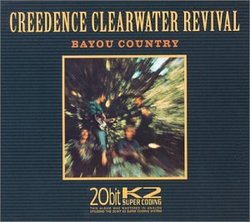| All Artists: Ccr Title: Bayou Country (20 Bit Mastering) Members Wishing: 2 Total Copies: 0 Label: Fantasy Release Date: 7/4/2000 Album Type: Original recording reissued, Original recording remastered Genres: Country, Pop, Rock, Classic Rock Styles: Oldies & Retro, Country Rock, Roots Rock, Southern Rock, Album-Oriented Rock (AOR) Number of Discs: 1 SwapaCD Credits: 1 UPC: 025218838726 |
Search - Ccr :: Bayou Country (20 Bit Mastering)
 | Ccr Bayou Country (20 Bit Mastering) Genres: Country, Pop, Rock, Classic Rock
Bayou Country is the CCR record that slips under the radar. The group's 1969 sophomore release birthed two classic-rock staples--"Born on the Bayou" and "Proud Mary." Then there's the characteristically savvy cover ("Good ... more » |
Larger Image |
CD DetailsSynopsis
Amazon.com Bayou Country is the CCR record that slips under the radar. The group's 1969 sophomore release birthed two classic-rock staples--"Born on the Bayou" and "Proud Mary." Then there's the characteristically savvy cover ("Good Golly Miss Molly"), the stretch-out jams ("Graveyard Train" and "Keep on Chooglin'"), and a couple of seldom remarked-upon album tracks ("Bootleg" and "Penthouse Pauper"). And that's it--a little more than a half-hour of the Revival gaining speed but still not firing on all cylinders. For a lesser band, it'd be an impressive achievement; for Creedence, Bayou Country is a mere steppingstone to greater heights. --Steven Stolder Similar CDs
|
CD Reviews'My papa said "Son, don't let the man getcha,"... James R. Gloeckner | Asheville, North Carolina United States | 10/22/2001 (4 out of 5 stars) "Nobody paid much attention to Bayou Country when it first came out in 1968...everyone was too enthralled with CCR's single release, Proud Mary. Somehow, one way or another, the album filtered into the top 40 dances and parties. If you have heard Proud Mary, and like it, and think you know the lyrics, you will never, ever, forget the opening chord to Born on the Bayou the first time you hear it. Dust, humidity, jungling forests, one- room shanties, coon dogs. Creedence doesn't invade this world- Creedence owns it, don't you know. Leon Russell did an album about ten years later called "Can a White Man Sing the Blues?', while this album, more to the point, says, "Can a white band STOMP the Blues?" If you have never heard Creedence before, which I guess is possible, though most of my generation (60's) wouldn't believe it, you will notice an edge to most of John Fogarty, the lead guitarist's, work, which takes the blues right to the edge of felonious mayhem. After "Born on the Bayou", the album eases back a little with the catchy "Bootleg", only to then rip the pistons and brakes off of "Graveyard Train". This is followed by "Good Golly Miss Molly", which had been popularized a few years before by Mitch Ryder and the Detroit Wheels, but Creedence plays it with not quite the screaming intensity Ryder bought to it...Fogarty, you might say keeps the guts of it while still bringing acceptable respect to what by now can only be called rhythm and blues turf. "Penthouse Pauper" is the only disappointing cut, but when you place it with the rest of the album, even "Penthouse Pauper" shows a downbeat, yet still audible expectant potential for the last two classics, "Proud Mary" and "Keep on Chooglin'".
Since "Proud Mary" has probably been reviewed thousands of (white) times, I'll skip directly to "Keep on Chooglin'" The lyrics are what I would call just short of a budweiser challenge. It's about people's need to socialize, and to drink, and to further socialize about having to drink to socialize. In these days of Ozzy Osbourne that probably sounds pretty tame, but I have yet to hear anyone come up with a line to beat, "Here come Louie, works in a sewer Lord, he goin' chooglin' tonight." And Fogarty's solos and riffs are sooo clean, sooo crisp, you forget that this is basically a three-bar boogie, played over and over again, like a demonstration of some professional hypnotist. The music's grittiness is practically always due to Fogarty playing against the rest of the band, so let me finally mention the rest of the personnel, for any solo record hounds that still may be out there. Tom Fogarty (John's brother), rhythm guitar; Stu Cook, bass Doug Clifford, drums." |

 Track Listings (7) - Disc #1
Track Listings (7) - Disc #1